 | ||||
| Full name | Levante Unión Deportiva, S.A.D. | |||
|---|---|---|---|---|
| Nickname(s) | Granotes (The Frogs) Los Azulgranas | |||
| Founded | 9 September 1909 | |||
| Ground | Ciutat de València | |||
| Capacity | 26,354[1] | |||
| President | Pablo Sánchez | |||
| Head coach | Javier Calleja | |||
| League | Segunda División | |||
| 2022–23 | Segunda División, 3rd of 20 | |||
| Website | Club website | |||
|
| ||||
Levante Unión Deportiva, S.A.D. (Spanish: [leˈβante wˈnjon depoɾˈtiβa]) is a Spanish football club in Valencia, in the namesake autonomous community.
Founded on 9 September 1909, Levante play in the Segunda División, holding home games at Ciutat de València Stadium.[2][3][4]
History
Early years (1909–1935)

Levante UD was formerly registered as Levante Football Club on 9 September 1909[5][6] (celebrating its 100th anniversary on 9 September 2009).[7] Thus Levante is the most senior football club in Valencia, with rival team Valencia CF not being formed until 1919.[8][9][10][11]
Levante shares its name with the eastern region of the Iberian Peninsula, with Spain's east coast, the coast over which the sun rises (levantar in Spanish),[12] with the Levant wind that comes from the east, and with the Levante beach in La Malvarrosa where Levante Football Club played some of its earliest fixtures.
Levante's earliest games were played at La Platjeta, near the docks on a plot of land owned by a perfume entrepreneur. Its next ground was also near the port area, and the club gradually became associated with the working class. In 1919, the side played Valencia CF for the first time, losing 0–1; the game marked the inauguration of the recently built ground at Algirós. In 1928, Levante FC won its first trophy, the Valencian Championship.
1909 also saw the birth of Gimnástico Football Club, which originally played at Patronato de la Juventud Obrera, being then named Gimnástico-Patronato. In 1919, Gimnástico became the champion of the Campeonato de Valencia, beating CD Castellón in two leg finals; the next year, the club had become Real Gimnástico Football Club, after being granted royal patronage by Alfonso XIII, and they reached the final of Campeonato Regional de Levante, but lost to Club Deportivo Aguileño. In 1931, with the founding of the Second Spanish Republic, the club dropped the Real from its name.
In 1934–35, both Levante and Gimnástico debuted in the second division, when the league was expanded from 10 teams to 24. In 1935, Levante won the Campeonato Levante-Sur, a competition that featured teams from Valencia, Murcia and Andalusia,[13] and subsequently reached the semi-finals of the Spanish Cup, consecutively beating Valencia and Barcelona before losing to eventual runners-up Sabadell.
During the civil war: Copa de la España Libre (1937)
During the Spanish Civil War, Levante and Gimnástico played in the Mediterranean League, finishing fifth and sixth respectively. Teams from this league also competed in the Copa de la España Libre ("Free Spain Cup"). It was originally intended that the top four teams from the league would enter the cup, but Barcelona opted to tour Mexico and the United States, and as a result, Levante took its place. The first round of the competition was a mini-league with the top two teams, Levante and Valencia, qualifying for the final. On 18 July 1937, Levante defeated its city rivals 1–0 at the Montjuïc.[14][15]
Merging: Gimnástico and Levante (1939)
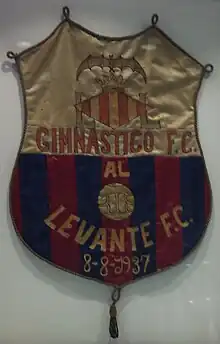
During the Civil War, Levante's ground was destroyed, but the club's squad remained intact. In contrast, Gimnástico had a ground, Estadio de Vallejo, but had lost most of their players. As a result, in 1939 Levante FC and Gimnástico FC merged into Levante Unión Deportiva.[16] Levante UD can thus trace its origin back to at least 1909 through both Levante FC and Gimnástico FC. The merged club was at first named Unión Deportiva Levante-Gimnástico, then changed it a few years later to Levante Unión Deportiva. The current club colours date from this era: the blaugrana, blue-garnet, home colours were originally those of Gimnástico FC, while the black and white away kit were the colours of Levante FC. Levante UD also inherited from Gimnástico FC their nickname, Granota, the Frogs.[17][18][11][9][19]
La Liga: relegations and promotions (1963–present)
Levante had to wait until the 1960s to make its La Liga debut. In 1963, the club finished runner-up in Group II of the second division, defeating Deportivo de La Coruña 4–2 on aggregate in the promotion play-offs. During the first top flight season, it managed to win both games against Valencia, and also achieved a 5–1 home win against Barcelona in the 1964–65 campaign, but was relegated nonetheless after losing in the playoffs against Málaga. It spent most of the following two decades in the second and third divisions; the Segunda División B would not be created until 1977.
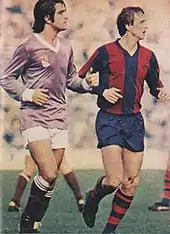
In the early 1980s, Dutch superstar Johan Cruyff played half a season for the club, retiring three years later. After winning 2003–04's second division, Levante returned to the top level but survived only one season. Finishing third in 2005–06, it returned for two additional campaigns, the decisive match in the 2006–07 season being a 4–2 home win against Valencia courtesy of Riga Mustapha (two goals), Salva and Laurent Courtois.
Levante's financial status worsened, however, and there were reports that the players had only received approximately one-fifth of their contractual payments. News reports stated that the club had incurred a debt of over €18 million in payments due to its players. The team plummeted down the standings, and it was confirmed with several matches to go that the club would be playing in the second division in 2008–09. The players protested at their lack of payments at one point, refusing to move for several seconds after the opening whistle against Deportivo and later announcing that they would strike during the season-ending game at Real Madrid. The threat was withdrawn when league officials announced that a benefit game would be played between a Levante XI and a Primera División XI, with all receipts going to pay the Levante players' wages.
On 13 June 2010, Levante returned to La Liga after a 3–1 home win against already relegated Castellón, making its final round 0–4 defeat at Real Betis irrelevant.[20] Under the manager who led the team back to the top flight, Luis García Plaza, Levante finally retained its top division status in the 2010–11 season. At one point in the league's second round of matches, Levante was third in the table behind Barcelona and Real Madrid, after losing just once (against Real Madrid) in 12 games.[21]

On 26 October 2011, during round nine of the season, Levante defeated Real Sociedad 3–2 to move top of the first division table for the first time in the club's history, with 23 points.[22] In the process, it recorded seven straight wins after drawing its first two games.[23] The club eventually finished sixth after defeating Athletic Bilbao 3–0 at home in its last match, thus qualifying for the UEFA Europa League for the first time in its history.[24] There, they made it to the last 16 before a 2–0 extra-time loss to Russia's FC Rubin Kazan.[25]
In the 2015–16 season, Levante was relegated after defeat by Málaga and finished last. The club was promoted back to the top league in 2016–17, winning the Segunda División title. In the 2017–18 season, the club secured safety in the league and on 13 May, beat the champions Barcelona 5–4 (having led 5–1 early in the second half), with Emmanuel Boateng scoring his first ever career hat-trick.[26] This win ended Barcelona's hopes of achieving an unbeaten season.[27]
In the 2021–22 season, Levante was relegated after being defeated 0-6 by Real Madrid, ending their five years in the top tier.
Seasons
Recent history
.jpg.webp)
| Season | Div | Pos. | Pld | W | D | L | GF | GA | Pts | Cup | Notes |
|---|---|---|---|---|---|---|---|---|---|---|---|
| 2003–04 | 2D | 1st | 42 | 22 | 13 | 7 | 59 | 33 | 79 | Last 16 | Promoted |
| 2004–05 | 1D | 18th | 38 | 9 | 10 | 19 | 39 | 58 | 37 | Relegated | |
| 2005–06 | 2D | 3rd | 42 | 20 | 14 | 8 | 53 | 39 | 74 | 1st round | Promoted |
| 2006–07 | 1D | 15th | 38 | 10 | 12 | 16 | 37 | 53 | 42 | Last 16 | |
| 2007–08 | 1D | 20th | 38 | 7 | 5 | 26 | 33 | 75 | 26 | Last 16 | Relegated |
| 2008–09 | 2D | 8th | 42 | 18 | 10 | 14 | 59 | 59 | 64 | ||
| 2009–10 | 2D | 3rd | 42 | 19 | 14 | 9 | 63 | 45 | 71 | Promoted | |
| 2010–11 | 1D | 14th | 38 | 12 | 9 | 17 | 41 | 52 | 45 | Last 16 | |
| 2011–12 | 1D | 6th | 38 | 16 | 7 | 15 | 54 | 50 | 55 | Quarter-finals | Qualified to UEFA Europa League |
| 2012–13 | 1D | 11th | 38 | 12 | 10 | 16 | 40 | 57 | 46 | Last 16 | Last 16 UEFA Europa League |
| 2013–14 | 1D | 10th | 38 | 12 | 12 | 14 | 35 | 43 | 48 | Quarter-finals | |
| 2014–15 | 1D | 14th | 38 | 9 | 10 | 19 | 34 | 67 | 37 | Last 16 | |
| 2015–16 | 1D | 20th | 36 | 7 | 8 | 21 | 34 | 66 | 29 | 1st round | Relegated |
| 2016–17 | 2D | 1st | 42 | 25 | 9 | 8 | 57 | 32 | 84 | 2nd round | Champions and Promoted |
| 2017–18 | 1D | 15th | 38 | 11 | 13 | 14 | 44 | 58 | 46 | Last 16 | |
| 2018–19 | 1D | 15th | 38 | 11 | 11 | 16 | 59 | 66 | 44 | Last 16 | |
| 2019–20 | 1D | 12th | 38 | 14 | 7 | 17 | 47 | 53 | 49 | Last 32 | |
| 2020–21 | 1D | 14th | 38 | 9 | 14 | 15 | 46 | 57 | 41 | Semi-finals | |
| 2021–22 | 1D | 19th | 38 | 8 | 11 | 19 | 51 | 76 | 35 | 2nd round | Relegated |
| 2022–23 | 2D | 3rd | 42 | 18 | 18 | 6 | 46 | 30 | 72 | Last 16 | Promotion Play-offs Runners-up |
European record
| Season | Competition | Round | Opposition | Home | Away | Aggregate |
|---|---|---|---|---|---|---|
| 2012–13 | UEFA Europa League | Play-off round | 1–0 | 2–0 | 3–0 | |
| Group L | 3–0 | 0–0 | 2nd | |||
| 2–2 | 1–2 | |||||
| 1–0 | 3–1 | |||||
| Round of 32 | 3–0 | 1–0 | 4–0 | |||
| Round of 16 | 0–0 | 0–2 (a.e.t.) | 0–2 |
Season to season
|
|
|
- 16 seasons in La Liga
- 39 seasons in Segunda División
- 12 seasons in Segunda División B
- 16 seasons in Tercera División
- 1 season in Categorías Regionales
Players
Current squad
- As of 5 September 2023.[28]
Note: Flags indicate national team as defined under FIFA eligibility rules. Players may hold more than one non-FIFA nationality.
|
|
Reserve team
Note: Flags indicate national team as defined under FIFA eligibility rules. Players may hold more than one non-FIFA nationality.
|
|
Out on loan
Note: Flags indicate national team as defined under FIFA eligibility rules. Players may hold more than one non-FIFA nationality.
|
|
Club officials
Current technical staff
| Position | Staff |
|---|---|
| Manager | |
| Assistant Managers | |
| Fitness Coach | |
| Goalkeeping Coach | |
| Analyst | |
| Technical assistant | |
| Chief of medical services | |
| Doctor | |
| Rehab fitness coach | |
| Rehab coach | |
| Physiotherapist | |
| Nutritionist | |
| Chiropodist | |
| Psychologist | |
| Delegate | |
| Field delegate | |
| Maintenance chief | |
| Equipment Manager |
Last updated: 29 October 2022
Source: Levante UD
Notable former players
Note: this list includes players that have appeared in at least 100 league games and/or have reached international status.
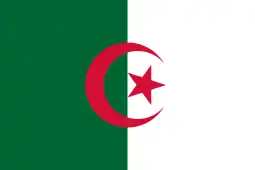 Abdelkader Ghezzal
Abdelkader Ghezzal Nabil Ghilas
Nabil Ghilas Pablo Cavallero
Pablo Cavallero Gustavo Reggi
Gustavo Reggi.svg.png.webp) Mitchell Langerak
Mitchell Langerak Andreas Ivanschitz
Andreas Ivanschitz Sávio
Sávio Wanderley
Wanderley Zé Maria
Zé Maria Vladimir Manchev
Vladimir Manchev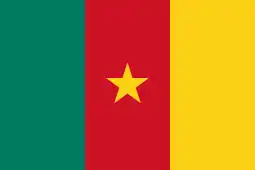 Daniel N'Gom Kome
Daniel N'Gom Kome Lauren
Lauren Albert Meyong
Albert Meyong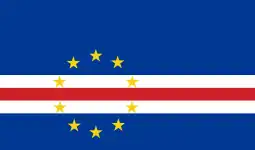 Valdo
Valdo José Veiga
José Veiga Carlos Caszely
Carlos Caszely Edwin Congo
Edwin Congo Jefferson Lerma
Jefferson Lerma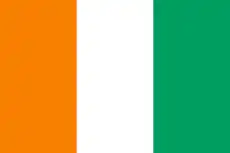 Félix Ettien
Félix Ettien Arouna Koné
Arouna Koné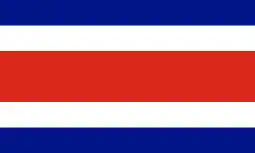 Keylor Navas
Keylor Navas Tomislav Erceg
Tomislav Erceg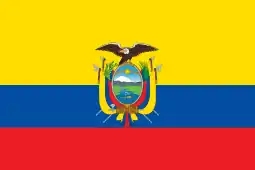 Felipe Caicedo
Felipe Caicedo Jefferson Montero
Jefferson Montero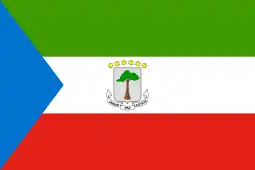 Sergio Barila
Sergio Barila Juvenal
Juvenal Yago
Yago Frédéric Déhu
Frédéric Déhu Olivier Kapo
Olivier Kapo Péguy Luyindula
Péguy Luyindula Laurent Robert
Laurent Robert Shota Arveladze
Shota Arveladze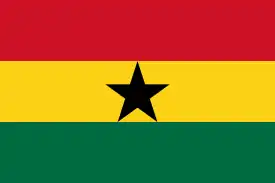 Emmanuel Boateng
Emmanuel Boateng Riga Mustapha
Riga Mustapha Theofanis Gekas
Theofanis Gekas Nikolaos Karabelas
Nikolaos Karabelas Loukas Vyntra
Loukas Vyntra Ian Harte
Ian Harte Damiano Tommasi
Damiano Tommasi Giuseppe Rossi
Giuseppe Rossi Enis Bardhi
Enis Bardhi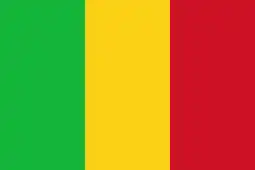 Mohamed Sissoko
Mohamed Sissoko Issam El Adoua
Issam El Adoua Nabil El Zhar
Nabil El Zhar Zouhair Feddal
Zouhair Feddal Moha
Moha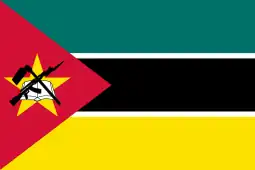 Simão Mate
Simão Mate Johan Cruyff
Johan Cruyff Faas Wilkes
Faas Wilkes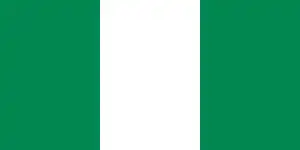 Obafemi Martins
Obafemi Martins Dariusz Dudka
Dariusz Dudka Duda
Duda Fahad Al-Muwallad
Fahad Al-Muwallad Vladan Kujović
Vladan Kujović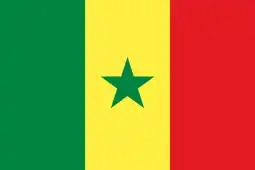 Baba Diawara
Baba Diawara Pape Diop
Pape Diop Rémi Gomis
Rémi Gomis Sylvain N'Diaye
Sylvain N'Diaye Alexis
Alexis Salva Ballesta
Salva Ballesta Sergio Ballesteros
Sergio Ballesteros Claudio Barragán
Claudio Barragán Antonio Calpe
Antonio Calpe Diego Camacho
Diego Camacho José Campaña
José Campaña Víctor Casadesús
Víctor Casadesús Ángel Cuéllar
Ángel Cuéllar Asier del Horno
Asier del Horno Iñaki Descarga
Iñaki Descarga Ernesto Domínguez
Ernesto Domínguez Javier Farinós
Javier Farinós Rubén García
Rubén García Sergio García
Sergio García Fernando Giner
Fernando Giner Sergio González
Sergio González Vicente Iborra
Vicente Iborra Jason
Jason Jofre
Jofre Juanfran
Juanfran Juanlu
Juanlu Vicente Latorre
Vicente Latorre Pedro López
Pedro López José Francisco Molina
José Francisco Molina José Luis Morales
José Luis Morales Nando
Nando David Navarro
David Navarro Miguel Pallardó
Miguel Pallardó Alberto Rivera
Alberto Rivera Gaspar Rubio
Gaspar Rubio Rubén Suárez
Rubén Suárez Vicente Rodríguez
Vicente Rodríguez Johan Mjällby
Johan Mjällby.svg.png.webp) Fabio Celestini
Fabio Celestini Enes Ünal
Enes Ünal Shaquell Moore
Shaquell Moore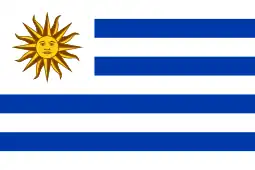 Gustavo Munúa
Gustavo Munúa Héctor Núñez
Héctor Núñez Tabaré Silva
Tabaré Silva Cristhian Stuani
Cristhian Stuani Emilio Rentería
Emilio Rentería.svg.png.webp) Predrag Mijatović
Predrag Mijatović
Coaches
 Josep Escolà (1955–56)
Josep Escolà (1955–56) Enrique Orizaola (1964–65)
Enrique Orizaola (1964–65) Mundo (1971)
Mundo (1971) José Juncosa (1972–73)
José Juncosa (1972–73) Héctor Núñez (1973–74)
Héctor Núñez (1973–74) Ferdinand Daučík (1974–75)
Ferdinand Daučík (1974–75) Dagoberto Moll (1975–76)
Dagoberto Moll (1975–76) Pachín (1979–81)
Pachín (1979–81) Joaquim Rifé (1981)
Joaquim Rifé (1981).svg.png.webp) Todor Veselinović (1981)
Todor Veselinović (1981) Vicente Piquer (1981)
Vicente Piquer (1981) Pachín (1984–85)
Pachín (1984–85) Quique Hernández (1987)
Quique Hernández (1987) Pachín (1987–88)
Pachín (1987–88) Antal Dunai (1990)
Antal Dunai (1990) José Antonio Irulegui (1990–91)
José Antonio Irulegui (1990–91) Luis Costa (1992)
Luis Costa (1992) José Enrique Díaz (1993–94)
José Enrique Díaz (1993–94) Jordi Gonzalvo (1994)
Jordi Gonzalvo (1994) Juande Ramos (1994–95)
Juande Ramos (1994–95) Mané (1996–97)
Mané (1996–97) José Enrique Díaz (1997)
José Enrique Díaz (1997) Jesús Aranguren (1998)
Jesús Aranguren (1998) Pepe Balaguer (1998-2000)
Pepe Balaguer (1998-2000) José Carlos Granero (2000–01)
José Carlos Granero (2000–01) Pepe Balaguer (2001-2002)
Pepe Balaguer (2001-2002) Carlos García Cantarero (2002–03)
Carlos García Cantarero (2002–03) Manuel Preciado (2003–04)
Manuel Preciado (2003–04) Bernd Schuster (2004–05)
Bernd Schuster (2004–05) José Luis Oltra (2005)
José Luis Oltra (2005) Mané (2005–06)
Mané (2005–06) Juan Ramón López Caro (2006–07)
Juan Ramón López Caro (2006–07) Abel Resino (2007)
Abel Resino (2007) Gianni De Biasi (2007–08)
Gianni De Biasi (2007–08) José Ángel Moreno (2008)
José Ángel Moreno (2008) Luis García (2008–11)
Luis García (2008–11) Juan Ignacio Martínez (2011–13)
Juan Ignacio Martínez (2011–13) Joaquín Caparrós (2013–14)
Joaquín Caparrós (2013–14) José Luis Mendilibar (2014)
José Luis Mendilibar (2014) Lucas Alcaraz (2014–15)
Lucas Alcaraz (2014–15) Rubi (2015–16)
Rubi (2015–16) Juan Muñiz (2016–18)
Juan Muñiz (2016–18) Paco López (2018–21)
Paco López (2018–21) Javier Pereira (2021)
Javier Pereira (2021) Alessio Lisci (2021–22)
Alessio Lisci (2021–22)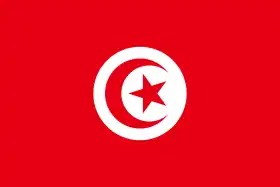 Mehdi Nafti (2022)
Mehdi Nafti (2022) Javier Calleja (2022–)
Javier Calleja (2022–)
Honours
National competitions
- Copa de la España Libre
- Segunda División
- Segunda División B
- Winners (5) - joint record: 1978–79, 1988–89, 1994–95, 1995–96, 1998–99
- Tercera División
- Winners (7): 1931–32, 1943–44, 1945–46, 1953–54, 1955–56, 1972–73, 1975–76
Regional competitions
- Campeonato de Valencia
- Winners: 1927–28
- Campeonato Levante-Sur
- Winners: 1934–35
Friendly tournaments
Stadium
Estadi Ciutat de València[4][3] was opened on 9 September 1969, with capacity for 25,354 spectators. The pitch measures 107 by 69 meters.
Due to the 2019–20 season's late finish because of the COVID-19 pandemic, and renovation work at their stadium, Levante concluded the campaign behind closed doors at the Estadi Olímpic Camilo Cano in La Nucia, Province of Alicante.[31]
Rivals
Levante contest the Derbi Valenciano, also known as the Derbi del Turia or Derbi Valentino, with local rivals Valencia.[32] The fixture has been played 38 times competitively, with Valencia winning 21 times to Levante's 8.
See also
- Atlético Levante UD, reserve team of Levante UD
- Levante UD Femenino, women's team
- Levante UD (beach soccer), beach soccer department
References
- ↑ "Levante: Paco López es el hombre de moda tras vencer al Barça". AS.com (in Spanish). 15 May 2018. Retrieved 25 January 2020.
- ↑ "Ten things you may not know about the Ciutat de Valencia stadium". Laliga.es. 13 September 2018. Retrieved 18 September 2018.
- 1 2 http://files.laliga.es/pdfs_estadios/estadio-ciutat-de-valencia.pdf
- 1 2 "Estadi Ciutat de Valencia - Levante". The Stadium Guide. Retrieved 18 September 2018.
- ↑ "Levante Unión Deportiva SAD". Laliga.es. 13 September 2018. Retrieved 18 September 2018.
- ↑ La nostra història, el nostre orgull
- ↑ El Levante cumple cien años
- ↑ ""Se siente, se nota, Valencia es granota"". 15 June 2010.
- 1 2 "La historia más enorme jamás contada". 28 November 2011.
- ↑ "El nacimiento del fútbol en Valencia". Levanteud.com. Retrieved 18 September 2018.
- 1 2 González, Emilio Nadal (16 December 2014). Siempre Tuyo, Levante Ud. ISBN 9788416048724.
- ↑ "Levant". Dictionary.com. Retrieved 18 September 2018.
- ↑ Spain – List of Champions of Levante, Valencia and Murcia; at RSSSF
- ↑ Spain – Copa de España Libre 1937; at RSSSF
- 1 2 La Federación reconoce la Copa del Levante de 1937 y la del Deportivo de 1912, [The Federation recognizes Levante's 1937 Cup and Deportivo's 1912 Cup], Noel Rodilla, Marca, 25 March 2023 (in Spanish)
- ↑ "Todo empezó en el mes de septiembre de 1909". Levanteud.com. Retrieved 18 September 2018.
- ↑ "Why are Levante called the 'granotas'?". Laliga.es. Retrieved 18 September 2018.
- ↑ La Vanguardia (26 October 2011). "Las diez leyendas del Levante". Lavanguardia.com. Retrieved 18 September 2018.
- ↑ "El Levante cumple cien años... Más dos". 31 August 2009.
- ↑ Levante are finally dethroned as La Liga becomes a more boring place; The Guardian, 31 October 2011
- ↑ Levante are back and this time they're ready to take on the world; The Guardian, 17 October 2011
- ↑ Levante pulls off the impossible; Sports Illustrated, 26 October 2011
- ↑ Underdog turns heads at the top in Spain; The New York Times, 28 October 2011
- ↑ "Ghezzal helps Levante secure European place". ESPN Soccernet. 13 May 2012. Retrieved 27 October 2013.
- ↑ "Rubin edge out Levante in extra time". UEFA. 14 March 2013. Retrieved 16 June 2020.
- ↑ "LaLiga – Levante 5–4 Barcelona: Emmanuel Boateng scores the first hat-trick of his career against Barcelona". MARCA in English. Retrieved 14 May 2018.
- ↑ Grounds, Ben (14 May 2018). "Levante 5-4 Barcelona: Catalans' unbeaten run comes to an end in nine-goal thriller". Sky Sports. Retrieved 31 August 2020.
- ↑ "Mercado de fichajes de LaLiga Hypermotion 2023-24" (in Spanish). Marca. Retrieved 17 August 2023.
- ↑ Trofeo Costa de Valencia;at RSSSF
- ↑ "Trofeo Comunidad Valenciana". 15 December 2017.
- ↑ "El At.Madrid jugará mañana contra el Levante UD en La Nucía" [At.Madrid will play tomorrow against Levante UD in La Nucía]. El Peridic (in Spanish). 22 June 2020. Retrieved 26 June 2020.
- ↑ "Valencian Derby: 8 Surprising Anecdotes About The Most Exciting Football Encounter". ISC Spain. 25 November 2015.
External links
- Official website (in Spanish and English)
- LaLiga Levante Unión Deportiva 1909 Forever
- Levante UD at UEFA (in Spanish)